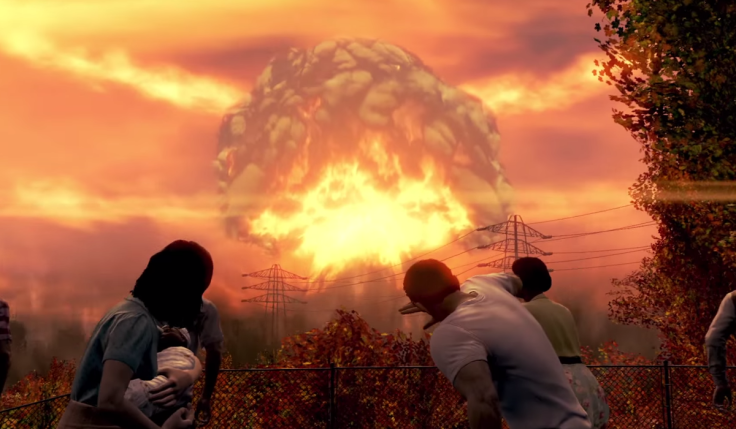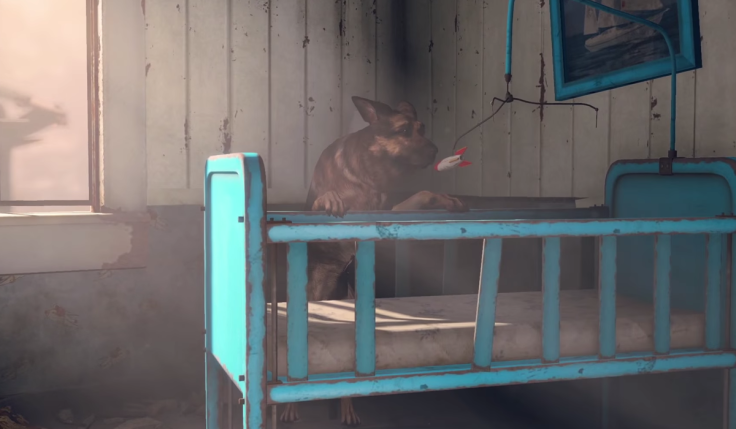We don't need to see the fallout before Fallout 4

If you've seen the Fallout 4 trailer by now, you'll have noticed that some scenes – a fair chunk, actually – are set before the series' eponymous nuclear fallout. This is a first. Fallout until now has been all about the Wasteland and the post-apocalypse world. Any glimpses into the past, and what life was like before the bombs fell, have been stolen, accorded via small moments and found artefacts, like children's toys and cereal packets.
And that's really beautiful. There's something acutely melancholic about picking over the wasteland, the bones of another America. Fallout has a wonderful, esoteric and amusing aesthetic - it exists in a world where every promise made during the space-race, every absurd gadget, came true. And although you never get to experience directly what came before, there's a terrific sense of loss.
A bombed out house with a few tossed beer bottles, a broken TV, some tattered nightwear doesn't tell you specifically what happened but it gives you the emotion, and that's what matters. Video games are far too pre-occupied by lore, much too bogged down in specifics of prequels and backstory. I adore Fallout because, without that naked commitment to world-building, it still communicates what once was, and how profoundly sad it is now it's been destroyed.
If the pre-apocalypse stuff in Fallout 4 is given the sort of attention suggested by the trailer – if there's a prologue section where you play as a family, hunting for a bomb shelter – a lot of the mysticism, the pervasive, uneasy sense of loss and loneliness in Fallout, will be damaged. It'll be too on the nose. And in a world of Gears of War novels, Assassin's Creed spin-offs and Halo TV series, who needs more backstory? The Fallout wastelands speak for themselves.
Anyone who's collected a toy car, a glass pitcher, a bottle of Nuka Cola gets a sense of what once was here - the idyllic, complacent domesticity. Even the people who are still alive – the survivors of the apocalypse – tell that story. Particularly in Fallout 3, everywhere you go there are pockets of humanity, not enough to constitute a civilization, but sufficient to imply how much the world has changed, how much has now been lost. This is a painful ex-society, eloquently and economically described. We don't need to see the bombs drop, or to know the specifics of the war, because thematically, this isn't what Fallout is about.
Yes, there's that awful, adhesive tagline: "war...war never changes" but that feels more to me like a hangover from the PR guys. At its core Fallout is a game not about war, unchanging or otherwise, but loneliness, abandonment and pining for change.
It seems perhaps absurd to bestow a video game with those novelistic qualities, not least a video game in which one of your principal interactions is using a laser gun to blow apart the head of a creature called a Supermutant. But truly, in the past, I've had those feelings. And I truly think that launching into the game's lore, and truncheoning players with a view of what life was like before the bombs dropped, is a shortcut way of robbing Fallout of its central, strongest characteristic - melancholia.

If anything, I would love a Fallout game with even fewer people, a game where it's essentially just you, alone, traipsing through the wasteland. I know this isn't coming – the Fallout 4 trailer is popping with scenes of villages, markets, battlegrounds – but the moments when I felt totally alone were when the old Fallout games were at their best. If there's one reason I would resist the prequel pre-apocalypse, it's because, for me, these have always been games about looking in, rather than out.
You're surrounded by death and danger, but there's tranquillity in Fallout, a touch of zen. Roaming from map icon to map icon, sleeping each night in a borrowed bed – it's like a road movie almost, and with that comes introspection. What resonates emotionally are not blunt images of human death and destruction, but the picture of this single person, wandering alone. That's a more telling and nuanced portrait of the apocalypse than people fighting over shelter space, or exploding before your eyes.
The Lone Wanderer of Fallout 3, committed to exploring place after place, is a person without a home, a human without a world. I hope Fallout 4 captures this again, and that the pre-apocalypse footage was just for the trailer. This series excels at using small, innocuous images as metaphor. We don't need to see Fallout's fallout.
© Copyright IBTimes 2025. All rights reserved.






















